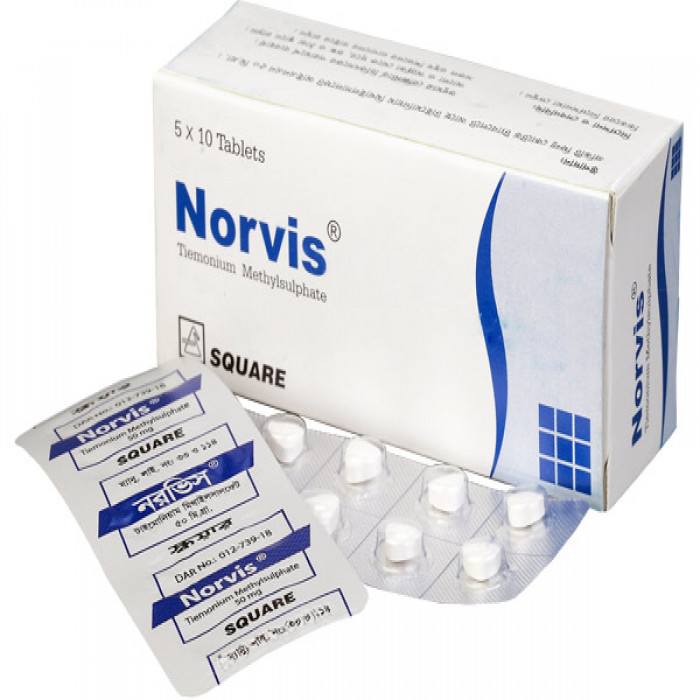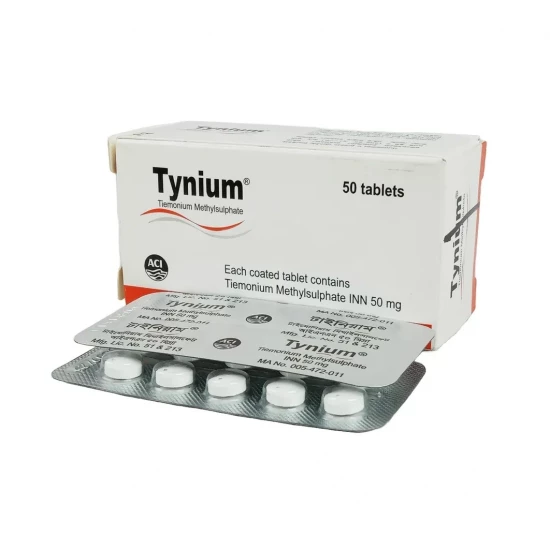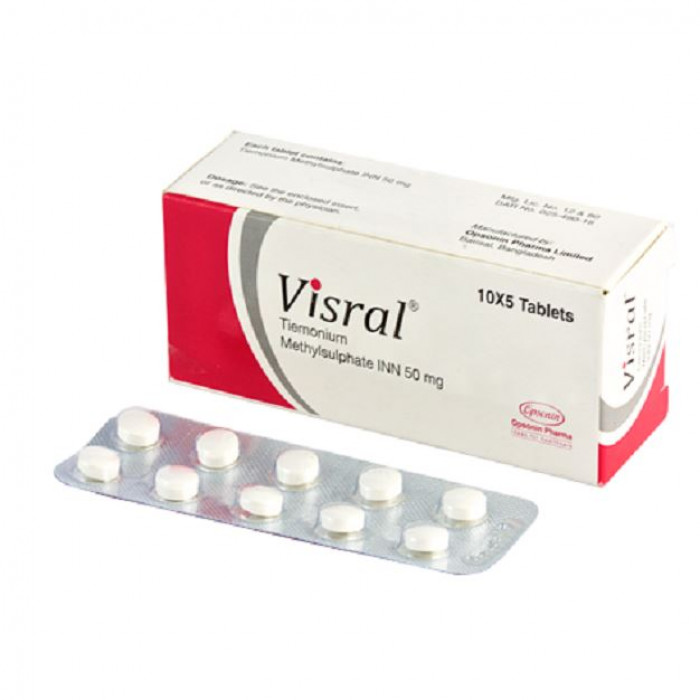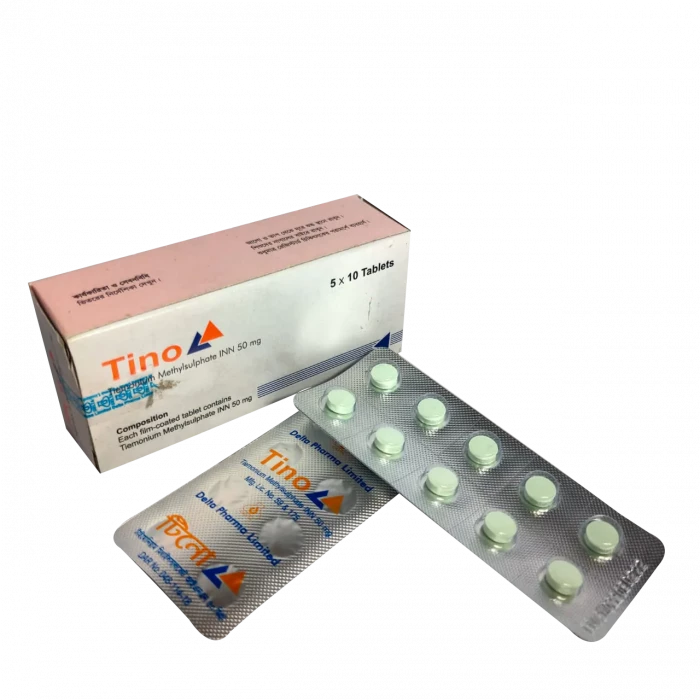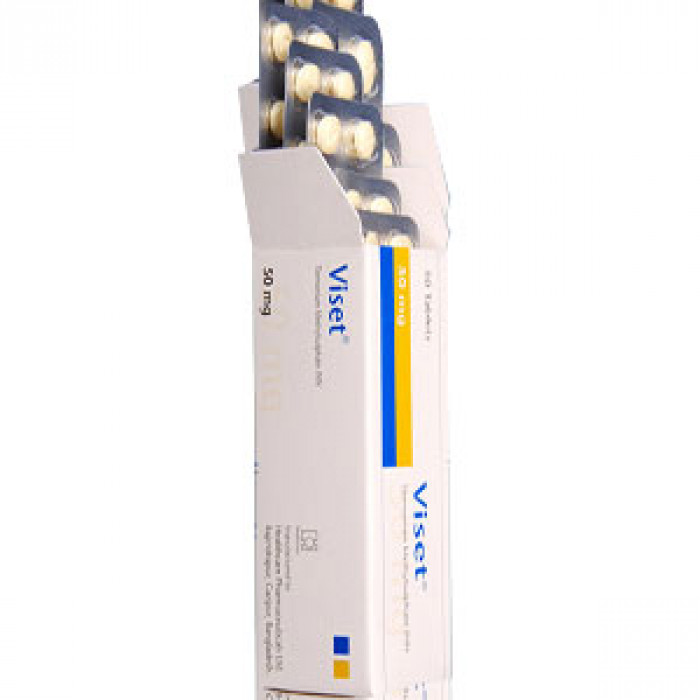
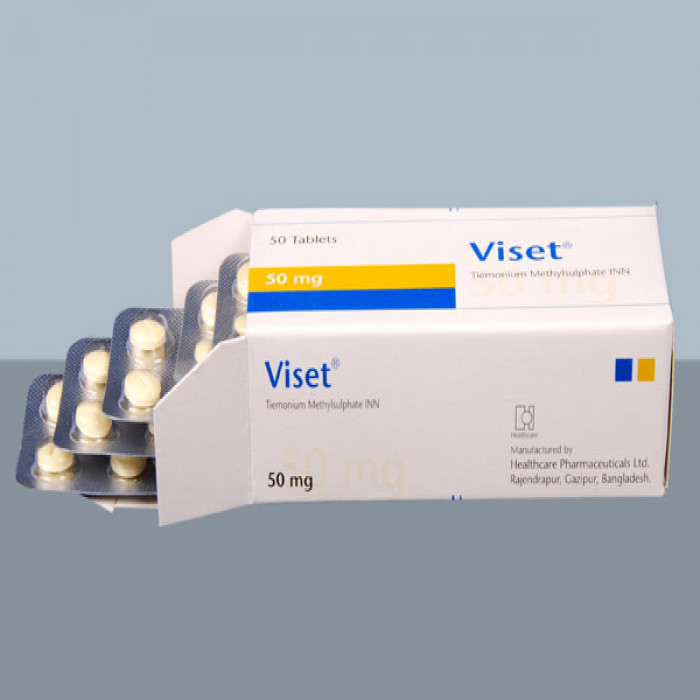
✔ 100% Authentic Product
👁️ Currently Viewing 8788
Viset 50mg Tablet
Tiemonium Methylsulfate is indicated for the treatment of gastroenteritis, diarrhea, dysentery, biliary, colic, enterocolitis, cholecystitis, colonopathies, and mild cystitis. Visonium is the drug of choice for the treatment of spasmodic dysmenorrhoea.
Discount
Price: ৳ 76
MRP:
৳
80
5%
Off

100% Genuine Products, Guaranteed

Safe & Secure Payments, Always

Fast, Secure & Efficient Delivery

Proper Packaging
 Cash on Delivery - All over Bangladesh
Cash on Delivery - All over Bangladesh Regular Delivery - 12-24 Hours, Dhaka City* Charge Tk.39-59
Regular Delivery - 12-24 Hours, Dhaka City* Charge Tk.39-59 Regular Delivery - 24-48 Hours, Other Cities* Charge Tk.99-110
Regular Delivery - 24-48 Hours, Other Cities* Charge Tk.99-110
🌙 রমযান অফার 🌙
 ফ্রি ডেলিভারিঃ - ৭৯৯ টাকা+ অর্ডারে, ঢাকা
শহরে
ফ্রি ডেলিভারিঃ - ৭৯৯ টাকা+ অর্ডারে, ঢাকা
শহরে ফ্রি ডেলিভারিঃ - ২৭৯৯ টাকা+ অর্ডারে, ঢাকার
বাহিরে
ফ্রি ডেলিভারিঃ - ২৭৯৯ টাকা+ অর্ডারে, ঢাকার
বাহিরে
📲 মোবাইল অ্যাপ অর্ডারে সাশ্রয় বেশী
-
Google Play Store থেকে ডাউনলোড
-
Apple Store থেকে ডাউনলোড
100% Genuine Products, Guaranteed
Safe & Secure Payments, Always
Fast, Secure & Efficient Delivery
Proper Packaging
 Cash on Delivery - All over Bangladesh
Cash on Delivery - All over Bangladesh Regular Delivery - 12-24 Hours, Dhaka City* Charge Tk.39-59
Regular Delivery - 12-24 Hours, Dhaka City* Charge Tk.39-59 Regular Delivery - 24-48 Hours, Other Cities* Charge Tk.99-110
Regular Delivery - 24-48 Hours, Other Cities* Charge Tk.99-110 ফ্রি ডেলিভারিঃ - ৭৯৯ টাকা+ অর্ডারে, ঢাকা
শহরে
ফ্রি ডেলিভারিঃ - ৭৯৯ টাকা+ অর্ডারে, ঢাকা
শহরে ফ্রি ডেলিভারিঃ - ২৭৯৯ টাকা+ অর্ডারে, ঢাকার
বাহিরে
ফ্রি ডেলিভারিঃ - ২৭৯৯ টাকা+ অর্ডারে, ঢাকার
বাহিরে- Google Play Store থেকে ডাউনলোড
- Apple Store থেকে ডাউনলোড
🌙 রমযান অফার 🌙
📲 মোবাইল অ্যাপ অর্ডারে সাশ্রয় বেশী
✅ Description:
Tiemonium Methylsulfate is indeed an antispasmodic medication that helps reduce muscle spasms in the digestive tract, biliary system, bladder, and uterus. It is used for symptomatic relief of pain associated with functional disorders of the digestive tract and biliary system. Additionally, it is indicated for treating spasms and pain in urological and gynecological diseases.
Some specific conditions where Tiemonium Methylsulfate can be used are:
- Dysentery: Inflammation of the intestines, causing diarrhea with blood and mucus.
- Diarrhea: Frequent, loose, and watery bowel movements.
- Gastroenteritis: Inflammation of the stomach and intestines, causing diarrhea, vomiting, and abdominal pain.
- Biliary colic: Pain caused by the contraction of the gallbladder or bile ducts.
- Enterocolitis: Inflammation of the colon and small intestine.
- Cholecystitis: Inflammation of the gallbladder.
- Colonopathies: Disorders affecting the colon.
- Mild cystitis and spasmodic dysmenorrhea: Conditions involving bladder inflammation and painful menstrual cramps.
- Visceral muscle spasm: Spasms in the smooth muscles of organs.
Tiemonium Methylsulfate is prescribed to alleviate the symptoms associated with these conditions, providing relief from pain and discomfort caused by muscle spasms in the affected organs. It should be used under the supervision and prescription of a qualified healthcare provider to ensure its safe and effective use.
✔️ Uses of Viset 50mg Tablet
- Dysentery
- Diarrhea
- Gastroenteritis
- Biliary colic
- Enterocolitis
- Cholecystitis
- Colonopathies
- Mild cystitis
- Spasmodic dysmenorrhoea
- Visceral muscle spasm
✔️ How does Viset 50mg Tablet work?
Tiemonium competitively antagonizes cholinergic stimulation. It also interferes with the contracting effects of BaCl2, as does papaverine. In contrast to papaverine, however, tiemonium shows an affinity for histamine H1-receptors and does not affect alpha-adrenergic receptor stimulation.
✔️ Side Effects of Viset 50mg Tablet
- Tiemonium Methylsulfate, like any medication, may cause undesirable effects in certain individuals. Some of the possible side effects of Tiemonium Methylsulfate include:
- Hypotension: Tiemonium Methylsulfate can cause a drop in blood pressure, leading to hypotension, which is characterized by dizziness, lightheadedness, and fainting in some cases.
- Tachycardia: Tachycardia refers to an abnormally rapid heart rate. Tiemonium Methylsulfate can have anticholinergic effects, which may lead to an increased heart rate in some individuals.
It's important to note that not everyone will experience these side effects, and their occurrence may vary based on individual factors such as age, overall health, and the dosage of the medication.
✔️ Indication
Tiemonium Methylsulphate is an antispasmodic sedative that reduces the fitness of the muscles in the digestive tract, biliary framework, bladder, and uterus. It is used to treat the symptoms of torment caused by utilitarian clutters of the stomach and biliary framework. It is also used to treat pain and discomfort in urological and gynecological illnesses.
✔️ Pharmacology
Tiemonium Methylsulfate is a synthetic anticholinergic-antispasmodic drug used to relieve spasms and cramps in the gastrointestinal (GI) tract. It is a quaternary ammonium antimuscarinic agent with peripheral effects similar to those of atropine. Tiemonium works by blocking certain receptors (muscarinic receptors) in the smooth muscles of the GI tract, leading to relaxation and decreased muscle contractions.
Additionally, Tiemonium strengthens calcium bonding with phospholipids and proteins, which helps stabilize the cell membranes in the GI tract. This stabilization contributes to reduced muscle excitability and decreased spasm formation.
Overall, Tiemonium Methylsulfate helps alleviate GI symptoms such as abdominal cramps and spasms, providing relief in conditions like irritable bowel syndrome (IBS) and other functional GI disorders. It is important to use this medication under the guidance and prescription of a qualified healthcare professional.
✔️ Dosage & Administration of Viset 50mg Tablet
The dosage recommendations for Tiemonium Methylsulfate in different forms (tablet/syrup, injection, and suppository) are as follows:
Tablet:
- Adult: The normal dosage for adults is 2-6 tablets or 3-9 teaspoonfuls of syrup per day, given in divided doses.
- Children: For children, the recommended dosage is 3 ml per kilogram of body weight or 6 mg per kilogram of body weight every day, administered in divided doses.
✔️ Interaction
It is essential to avoid using Tiemonium Methylsulfate tablets with other medications without first consulting a registered doctor. Drug interactions can occur when two or more medications interact with each other, leading to changes in their effects, potency, or safety.
Some drugs may enhance or diminish the effects of Tiemonium Methylsulfate, potentially leading to adverse reactions or reduced therapeutic efficacy. Conversely, Tiemonium Methylsulfate may also affect the way other medications work in the body.
✔️ Contraindications
Viset 50mg Tablet should not be used in patients with urethroprostatic disorders, as it may increase the risk of urine retention. It is also contraindicated in individuals with a history of closed-angle glaucoma, as it can worsen the condition.
✔️ Pregnancy & Lactation
The results of animal studies on Tiemonium Methylsulfate did not show any teratogenic effects, meaning it did not cause birth defects. Additionally, no abnormalities or deformities have been reported with regular use of the medication.
However, due to the limited data available on the use of Tiemonium Methylsulfate in breastfeeding mothers, caution should be exercised. While no problems have been reported with normal use, it is always advisable for nursing mothers to be cautious and consult their healthcare provider before using any medication.
When it comes to pregnant and breastfeeding women, it's essential to weigh the potential benefits of using the medication against any possible risks to the mother and the baby. Healthcare providers typically consider the severity of the condition being treated and alternative treatment options when making a decision regarding medication use during pregnancy and breastfeeding.
As with any medication, it is crucial to use Tiemonium Methylsulfate under the guidance and prescription of a qualified healthcare provider, especially during pregnancy and breastfeeding, to ensure the safety and well-being of both the mother and the baby.
✔️ Precautions & Warnings
Precautions should be taken when treating patients with certain medical conditions using Tiemonium Methylsulfate. Here are some important precautions to consider:
- Disorders of the Prostate: Tiemonium Methylsulfate may cause urine retention, which can be particularly concerning for individuals with prostate disorders. Caution is advised in such cases.
- Serious Kidney or Liver Diseases: Patients with severe kidney or liver diseases may require dose adjustments or close monitoring while using Tiemonium Methylsulfate, as impaired organ function can affect drug metabolism and elimination.
- Cardiac Disorders: Tiemonium Methylsulfate has anticholinergic properties that may affect heart rate and rhythm. It should be used cautiously in patients with cardiac disorders.
- Thyroid Disorders: Tiemonium Methylsulfate may exacerbate symptoms in patients with thyroid disorders. Close monitoring is advisable in such cases.
- Chronic Bronchitis: As an anticholinergic medication, Tiemonium Methylsulfate may worsen symptoms in patients with chronic bronchitis or other respiratory conditions. Caution should be exercised.
- Gastrointestinal Diseases: Certain gastrointestinal disorders may be aggravated by the use of Tiemonium Methylsulfate. Careful evaluation and monitoring are necessary for patients with these conditions.
- Visual Disturbances: Tiemonium Methylsulfate can cause visual disturbances, such as blurred vision and pupil dilation. Patients experiencing these effects should avoid driving or operating machinery until the effects wear off.
It's essential for healthcare providers to assess a patient's medical history comprehensively and consider potential interactions or contraindications before prescribing Tiemonium Methylsulfate. Patients should inform their healthcare providers about any existing medical conditions and medications they are taking to ensure safe and effective treatment. Regular follow-up visits with the healthcare provider are also important to monitor the patient's response to the medication and address any concerns or side effects that may arise.
✔️ Storage Conditions
Keep in a dry put, absent from light and warm. Keep out of the reach of children.
⚠️Disclaimer:
At ePharma, we’re committed to providing accurate and accessible health information. However, all content is intended for informational purposes only and should not replace medical advice from a qualified physician. Please consult your healthcare provider for personalized guidance. We aim to support, not substitute, the doctor-patient relationship.













